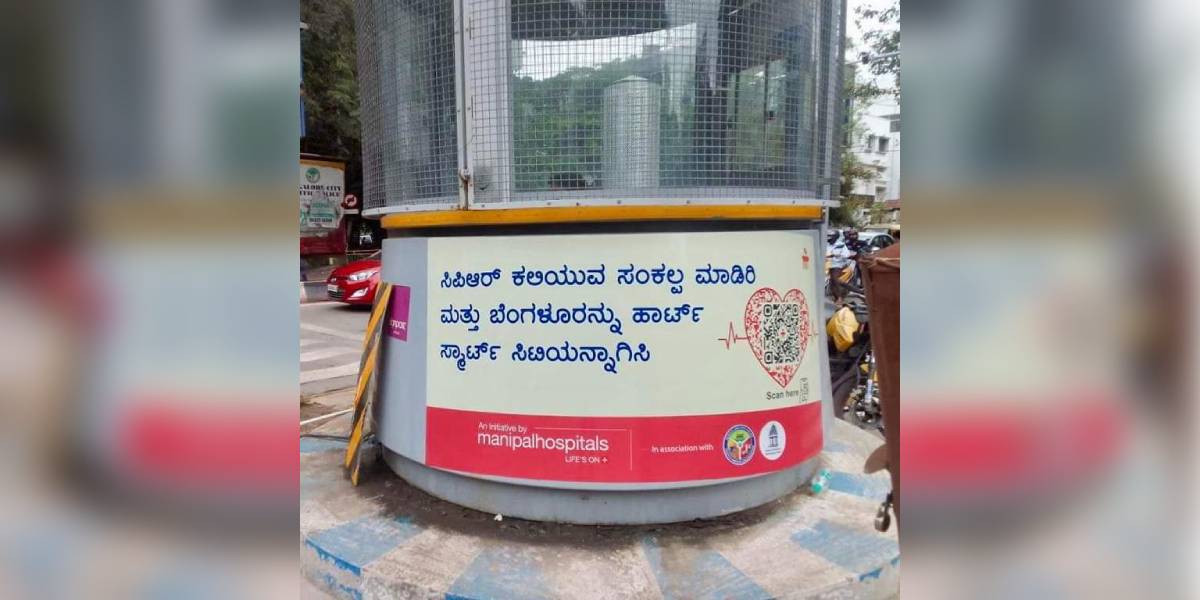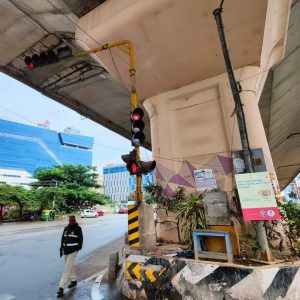Manipal Hospitals' unique tech solution aims to teach CPR to every individual through QR codes at traffic signals.

QR code-based CPR training now at Bengaluru's traffic signals. Manipal Hospitals initiative (Supplied)
QR codes at Bengaluru’s traffic signal will teach people how to do cardiopulmonary resuscitation (CPR), a first aid technique that is a combination of rescue breaths and chest compressions.
A unique initiative by Manipal Hospitals in coordination with the Bengaluru Traffic Police and the Bruhat Bengaluru Mahanagara Palike (BBMP) has seen QR codes put up at several signals of Bengaluru.
Anyone can scan them and learn to give CPR and save a person’s life.
The programme was rolled out on Saturday, 1 October.
“Imagine you are in the middle of traffic and you see someone having a cardiac arrest. Then this QR code scan can teach the person how to do CPR in just two minutes,” said a release from the hospital.

QR codes at Bengaluru’s traffic signals to teach CPR training. Code takes you to hospital’s link where there is also an option call emergency help. (supplied)
When somebody goes into cardiac arrest, they are clinically dead, and bystanders need to act quickly and confidently to give them the best chance of survival.
This is why it’s crucial that as many people as possible learn the very basics of CPR.
“It’s not complicated at all. But many people don’t know how to do it, or are scared that they may do it wrong. This hesitation may cost someone’s life. It takes less than two minutes to learn. So, this QR code scan is not only accessible but makes it very easy to learn CPR,” claimed hospital sources.
A release from the hospital explained that when anyone can scans the QR code at the traffic signals.
“One QR code will take us to CPR awareness video, and the other QR code will take them to the ambulance assistance,” according to the release.
“In medical emergencies, it is hard to have the presence of mind and remember numbers. Keeping this in mind, we came up with QR codes that are installed across all signals with the help of Bengaluru City Traffic Police,” Deepak Venugopalan, Regional COO, Bengaluru Cluster, Mysuru and Salem, told South First.
Meanwhile, on World Heart Day, the hospital also rolled out a digital CPR training programme.
The programme saw participation from Police, RWA, College students, fitness enthusiasts, Uber/Ola members, bikers, metro employees, security RWA, and sports coaches.
A CPR machine (dummy) was installed at the hospital.
The red and green lights on the dummy indicated the compression level exerted on the chest during the CPR, with a green blink indicating the amount of pressure put to save a life.
If it blinked green, the amount of pressure put to save a life was done appropriately.
Meanwhile, cardiologists have suggested that the state government should make CPR training mandatory for all high school and college students.
A group of cardiologists from KMC Hospital in Mangaluru in Karnataka on Thursday expressed the need to include CPR as part of the syllabus for high school students.
Head of the Department of Cardiology of the KMC hospital in Mangaluru, Dr Padmanabha Kamath, told reporters that CPR increased the chances of survival of a person who had suffered a heart attack.
“Though we know about CPR and see it on YouTube, not many come forward to do it. There is a need for people, starting from high school students, to have hands-on training in CPR. It has to be done within two minutes of cardiac arrest,” he said.

Jul 26, 2024

Jul 26, 2024

Jul 26, 2024

Jul 26, 2024

Jul 26, 2024

Jul 26, 2024